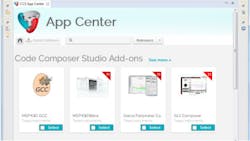Code Composer Studio v6 (CCS) is the latest IDE from Texas Instruments (TI). This incarnation addresses the wide range of CCS developers starting with a simplified user interface for new users in addition to an App Center designed to get the right software into the hands of developers. It also incorporates intelligent learning tools to familiarize developers with TI hardware and software technology. CCS v6 addresses the breadth of TI hardware from microcontrollers like the MSP-430 to ARM processors and DSPs.
Related Articles
Building on Eclipse has a number of advantages including providing more interoperability between 3rd party tools. It also allows the platform to support different programming languages. The downside is that the environment can be quite complex so it can handle very large, multilingual applications. Many embedded developers often have more limited requirements and don't want to need to learn all these other details. This is a significant portion of TI's developers so coming up with a simplified UI makes a lot of sense (Fig. 1). It allows new developers to get started quickly and master the basics while being able to take advantage of more advanced features when necessary.
Related Articles
- Development Kits Light Up The Internet Of Things
- Cortex-M4F Targets Connected Embedded Applications
- New RTOS Builds On DSP Roots
The simplified mode of operation exposes the essentials but hides some of the more advanced features. The user can switch to the full development mode or back at any time. The projects work in both environments.
Developers that have started with the Energia open source electronics prototyping platform have a migration path to CCS that can now build and import Energia sketches or projects. Energia is based on the Wiring and Arduino platform. One target is the MSP-430 Launchpad that is also supported by CCS.
The App Center (Fig. 2) can be used from the simplified UI but it power users will find it useful in accessing the plethora of hardware and software support including third party tools. Some of the TI tools include TI-RTOS (see “New RTOS Builds On DSP Roots”), MSP430Ware, C2000 controlSUITE, TivaWare (see “Cortex-M4F Targets Connected Embedded Applications”), GUI Composer, and the C compiler for the SitaraTM AM335x’s Programmable Real-Time Unit (PRU).
The App Center is actually built on the Eclipse package distribution system but it has a much nicer interface. This does two things. First, it makes the interface easier to use. Second, it means that the packages are well defined and can be created by developers. This would allow distribution of tools and software within a larger organization or as part of a collaborative effort.
Also in this version of CCS are enhanced training tools that include the Optimizer Assistant plus the Ultra-Low Power Advisor. These are handy for optimizing power consumption of an application or to see how well a platform will do on a benchmark (see “Interview: Markus Levy Discusses The EEMBC Ultra Low Power Benchmark”).
CCS v6 is based on the latest release of Eclipse that has its own new features. This allows developers to take advantage of open source tools like gcc compilers as well as TI's own compilers. This also means that CCS v6 will work with the latest set of 3rd party Eclipse plug-ins some of which are available through the App Center.
There are a host of other changes in CC6 . For example the instrumentation trace module provides data variable tracing support. It even highlights interrupt names within the trace. Of course, there are improvements in the Optimizer Assistant and Utra-Low Power Advisor as well such as support for the latest microcontrollers.
CCS v6 is free for Linux and Android application developers. The platinum license version is $495. An MSP-430 user can use TI's compiler in the free version to build applications up to 16 Kbytes although there is no size restriction if the gcc compiler is used. CCS is also included most of TI's development platforms.
About the Author
William G. Wong
Senior Content Director - Electronic Design and Microwaves & RF
I am Editor of Electronic Design focusing on embedded, software, and systems. As Senior Content Director, I also manage Microwaves & RF and I work with a great team of editors to provide engineers, programmers, developers and technical managers with interesting and useful articles and videos on a regular basis. Check out our free newsletters to see the latest content.
You can send press releases for new products for possible coverage on the website. I am also interested in receiving contributed articles for publishing on our website. Use our template and send to me along with a signed release form.
Check out my blog, AltEmbedded on Electronic Design, as well as his latest articles on this site that are listed below.
You can visit my social media via these links:
- AltEmbedded on Electronic Design
- Bill Wong on Facebook
- @AltEmbedded on Twitter
- Bill Wong on LinkedIn
I earned a Bachelor of Electrical Engineering at the Georgia Institute of Technology and a Masters in Computer Science from Rutgers University. I still do a bit of programming using everything from C and C++ to Rust and Ada/SPARK. I do a bit of PHP programming for Drupal websites. I have posted a few Drupal modules.
I still get a hand on software and electronic hardware. Some of this can be found on our Kit Close-Up video series. You can also see me on many of our TechXchange Talk videos. I am interested in a range of projects from robotics to artificial intelligence.



